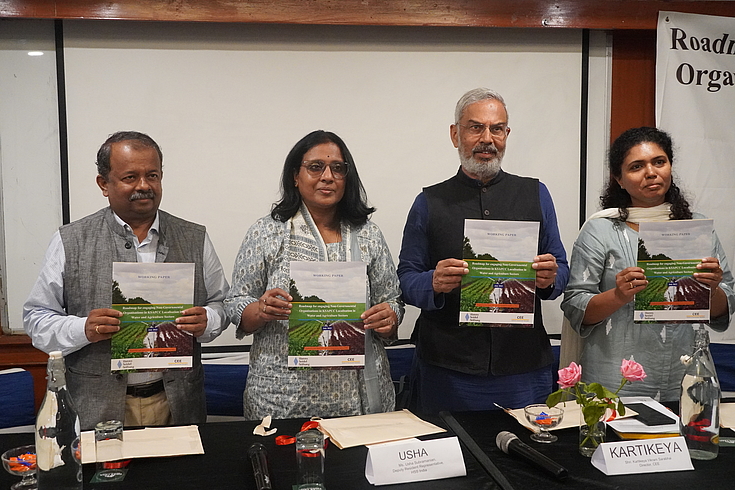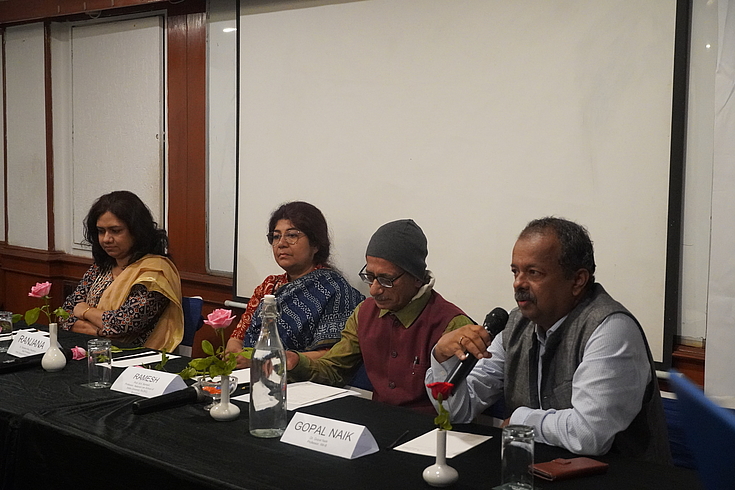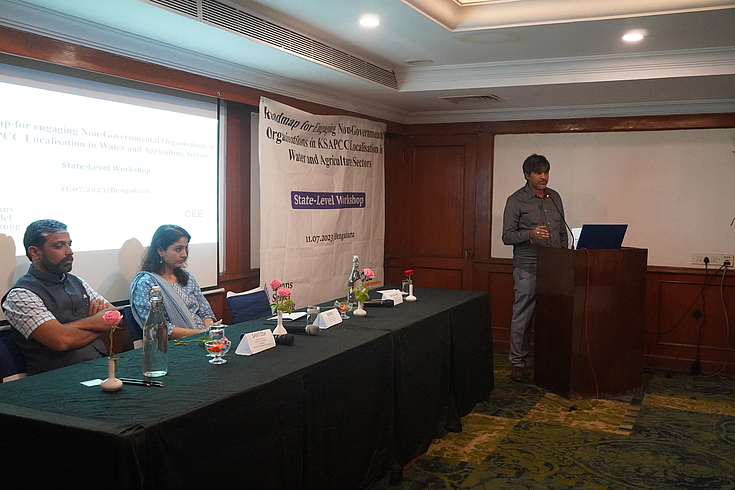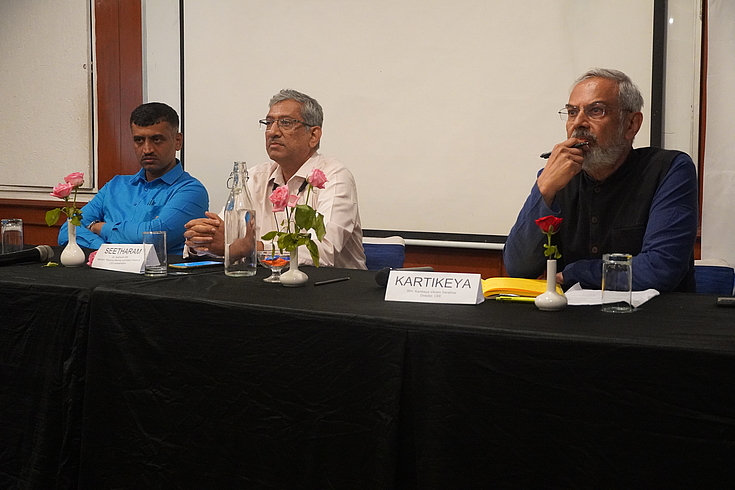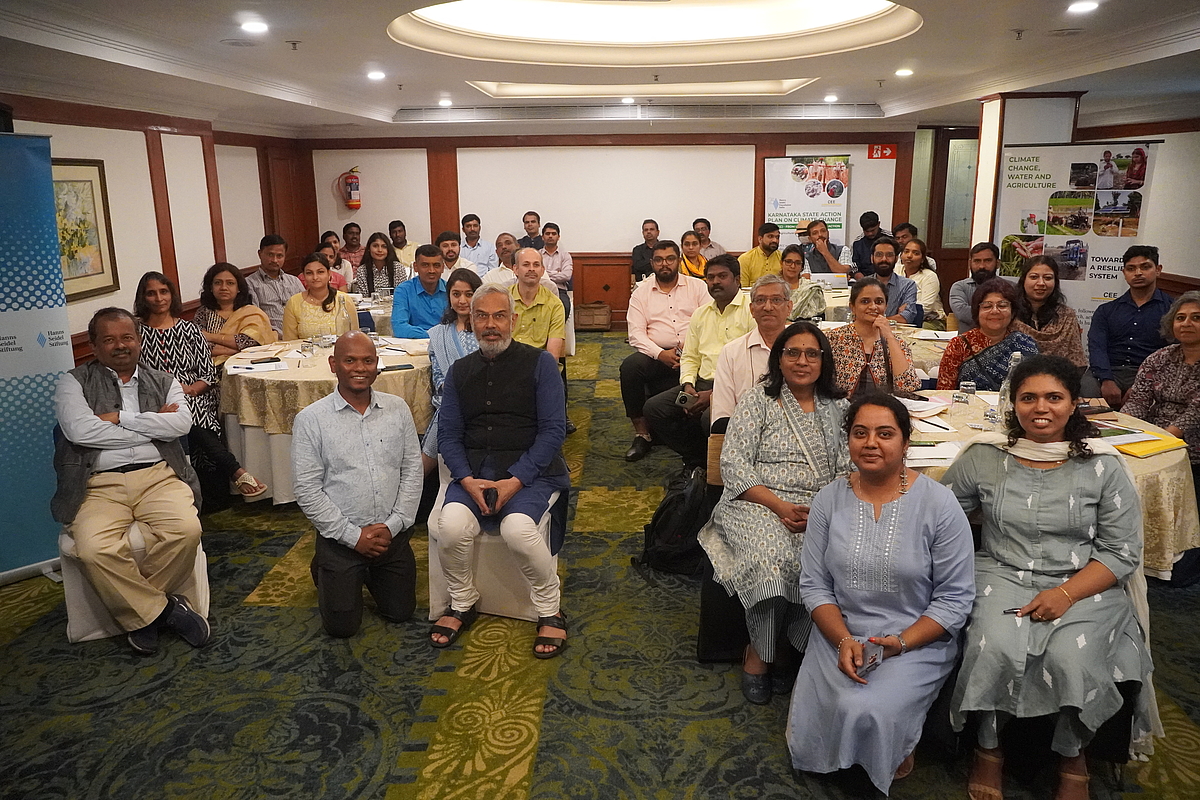News
State-Level Workshop
Evolving a whole-of-society approach for climate action
State governments in India are steadily shifting from the sectoral approach to the whole-of-government approach to localising SDGs and enhancing climate action. This shift is often reflected in their climate policies. A whole-of-government approach would ensure that the process to address climate change and other interrelated socio-economic challenges remains multi-stakeholder for enhanced governance, rapid resource mobilisation and better community engagement. However, to take the subnational climate agenda forward, it is critical that the government also collaborate with non-government actors, especially the NGOs, that will help localise the state policies to achieve the desirable change. Thus, it is time to transit to the whole-of-society approach from the whole-of-government approach, to make the process of change more holistic, multistakeholder and inclusive. The NGO workshop held by HSS in collaboration with CEE in Bangalore on 11 July 2023 was a step towards enabling the transition to the whole-of-society approach.
The one-day state level workshop engaged the NGOs in a deliberation over the second version of the Karnataka State Action Plan on Climate Change (KSAPCC). The workshop primarily explored 1) the role of NGOs in climate governance, 2) how to engage NGOs in climate action and 3) how to build an NGO network for collaborative action. To foster the NGO engagement for collaborative climate action, CEE with support of HSS had developed a working paper, entitled “Roadmap for engaging Non-governmental Organisations in KSAPCC Localisation”. Besides NGOs, other stakeholders such as policymakers, scientists, academicians, sectoral experts, representatives from civil society participated in the workshop.
Unveiling of the Working Paper
The inaugural of the workshop began with the introductory remarks by Ms Rejini Simpson, Programme Director, CEE Bangalore. Ms Usha Subramanian, Deputy Resident Representative, HSS India, delivered welcome speech, in which she added that having a policy in place is easier, but taking it to people has always been a challenge. NGOs act as connector to taking the policy to the people. Mr Kartikeya Sarabhai, Director, CEE, delivered the inaugural speech. Mr Sarabhai noted that multistakeholder approach is important but lacks robust mechanism for its operationalisation. Government often treats NGOs as delivery partner in policy implementation. What is needed is that NGOs be provided space for innovation and inclusivity, he added. Dr Gopal Naik, Jal Jeevan Mission Chair Professor, Utility Development & Water Economics, Indian Institute of Management, Bangalore made the guest speech. Dr Naik emphasized on the need for enhanced orientation training of the government engineers in effective communication with the communities to bridge the communication gap and bring the communities closer to the development process.
Dr Gopal Naik, Mr Kartikeya Sarabhai, Ms Usha Subramanian, and Ms Rejini Simpson unveiled the working paper. After the unveiling, the paper was distributed among the participants. It was followed by a detailed presentation by Ms Kavya R, Project Officer, CEE Bangalore. The paper is the first of its kind and looks at the history, the present context and the institutional space provided by KSAPCC for NGO engagement in localising the climate policies in Karnataka. Additionally, it maps out a concrete action plan for the state NGOs based on the second version of the KSAPCC.
Role of NGOs in climate governance
After the inaugural, the first session “Strategic Roadmap for NGO engagement and advocacy on Climate Change” chaired by Dr Gopal Naik began. Speaking on the government approach to work with NGOs for climate change adaptation, Prof M.K. Ramesh, Professor, National Law School of India University (NLSIU), Bangalore, who contributed a chapter, entitled ‘Institutional Mechanism for SAPCC Implementation’ in the second version of KSAPCC, talked about the architecture of climate governance as described in the KSAPCC. He explicated it further saying that it has five segments: Apex level (Inter-ministerial Council), Top level (Steering Committee), Middle level (Coordination and Management Committee), Third level (Sectoral Units) and Fourth level (District Level). To do away with the ‘compartmentalized functioning’ of various state agencies, the Middle level has been envisaged. Civil Society organisations are also to be represented at this level.
The presentation of Dr Ranjana Ray Chaudhuri, Assistant Professor, TERI School of Advanced Studies, focused on the role of NGOs in climate governance. She identified NGOs as one of the key social actors underpinning the global climate governance. According to here, NGOs help complete the iterative process of climate action and knowledge generation. Ms Shrimoyee Bhattacharya, Program Lead, Urban Development, WRI India, talked about ‘Climate Action and Resilience Plan of Bangalore’ that WRI has developed. She emphasized on the need for developing such plan for each city in India.
NGO engagement in climate action
The second session “NGOs and Climate Action-Water and Agriculture Sectors” was chaired by Dr Srinivas Ravindra, Executive Director, Centre for Sustainable Development, Bangalore. In his chair remarks, he delved into the origin, evolution and history of NGOs and their roles in India’s development. He underlined that NGOs kept changing their paths from time to time, depending on the government’s developmental priorities, from poverty eradication to sustainable development. NGOs have lot of advantages over government bodies as NGOs are smaller in size and flexible and have huge outreach among communities. NGOs are emerging as the fifth pillar of democracy, he claimed. Ms Simrin Bains Chhachhi, Senior Research Manager, Selco Foundation, Bangalore, presented case studies on climate change, agriculture value chain and poverty and how NGOs can help the affected people cope with climate change and become prosperous. Mr Santosh Nargund, Head, Civic Participation, Janaagraha Centre for Citizenship and Democracy shared his experiences on how to build civic participation for climate action and what role NGOs can play in doing so. He urged that ward committees (WCs) that is the fourth tier of the government be formed, strengthened, and institutionalised and participatory budgeting across the cities be held to catalyse a citizen participation campaign for climate action.
NGO network for collaborative action
The third (last) session “Mobilising Collaborative Climate Action in Water & Agriculture Sectors” was chaired by Mr Kartikeya Sarabhai. Dr Seetharam MR, Member, Regional Steering committee, FANSA, spoke on building collaborative platforms. He highlighted few concerns about the NGO network building. Finding a common ground is often difficult. Each organisation has different priorities, opinions, and approaches. Therefore, it will be important first to chart a convergent path for all the NGOs to walk together, he emphasized.
Mr Ganapati Bhat, Managing Director, Manuvikasa, Uttara Kannada, shared his experience on the NGO networking in the northern part of Karnataka. He said, NGO network can be formed on common issues. E.g., siltation in the Varda River. An NGO network on river conservation can be formed. It is also important that issues of marginalised communities such as tribals are included in the NGO network agenda to make in holistic and more inclusive.
In his chair remarks, Mr Sarabhai noted that the need of the hour is local decision making which will provide local solutions to the climate problems. But, to implement the local solutions, local people need to have the requisite capacity. Let us attempt to form a network to capacitate the local people to usher in the implementation of the local solutions to deal with climate change.
After that, a 5-point collaborative climate action was presented which was developed by aggregating the suggestions collected from the participants during the workshop.
5-Point Action
- Develop a replicable, resilient, and sustainable model to tackle the impacts of climate change in agriculture.
- Help local authorities to prepare a climate action plan for localizing KSAPCC.
- Take upon capacity building of stakeholders for raising climate finance.
- Spread awareness of KSAPCC and its action points among the target groups.
- Provide support for institution building to enable climate action at grassroots level.

